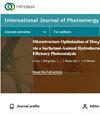应用RSM和ANN优化溶剂萃取法从大型海藻Spirogyra中提取油脂
IF 2.1
4区 工程技术
Q3 CHEMISTRY, PHYSICAL
引用次数: 1
摘要
采用索氏实验装置,以正己烷为溶剂,对螺藻的油脂提取工艺参数进行了优化。采用响应面法(RSM)和人工神经网络(ANN)对油脂提取过程中的藻粉粒度、藻粉干燥度、固溶比、反应时间和提取温度进行了优化。并对提取油的理化性质进行了研究。在RSM和ANN模型之间进行了比较评估,以选择更精确和准确的模型。人工神经网络的决定系数R2为98.92%,平均绝对百分比偏差(MAPD)为0.492%,表明当前创建的网络拓扑为3 : 11 : 1,在输入层中使用tansig(双曲正切sigmoid)传递函数,在输出层中使用purelin(纯线性)传递函数用trainlm(Levenberg–Marquardt)算法训练,发现在输出预测中提供了具有更好精度的最优解。所研究的物理化学性质,如热值、闪点、密度、粘度、碘值、酸值、皂化值和十六烷指数,表明从螺藻中提取的油可以用作替代燃料。本文章由计算机程序翻译,如有差异,请以英文原文为准。
Optimization of Oil Yield from the Macro Algae Spirogyra by Solvent Extraction Process Using RSM and ANN
The present work was done to optimize the process parameters of the oil extraction from the algae species spirogyra by using n-hexane as the solvent using the Soxhlet apparatus. The response surface methodology (RSM) and artificial neural network (ANN) were employed to optimize the particle size of the algae powder, dryness level of the algae powder, solid to solvent ratio, reaction time, and extraction temperature of the oil extraction process. Also, the physiochemical properties of the extracted oil were investigated. The comparative evaluation was done between the RSM and ANN models to select the more precise and accurate model. The coefficient of determination,
R
2
of 98.92%, and the mean absolute percentage deviation (MAPD) of 0.492% for ANN revealed that the current model created with a network topology of 3 : 11 : 1 with tansig (hyperbolic tangent sigmoid) transfer function in the input layer and purelin (pure linear) transfer function in the output layer trained with trainlm (Levenberg–Marquardt) algorithm found to provide the optimal solution with better accuracy in prediction of the output. The physicochemical properties investigated, such as heating value, flashpoint, density, viscosity, iodine number, acid value, saponification value, and cetane index, showed that the extracted oil from the algae spirogyra species can be used as an alternative fuel.
求助全文
通过发布文献求助,成功后即可免费获取论文全文。
去求助
来源期刊
CiteScore
6.00
自引率
3.10%
发文量
128
审稿时长
3.6 months
期刊介绍:
International Journal of Photoenergy is a peer-reviewed, open access journal that publishes original research articles as well as review articles in all areas of photoenergy. The journal consolidates research activities in photochemistry and solar energy utilization into a single and unique forum for discussing and sharing knowledge.
The journal covers the following topics and applications:
- Photocatalysis
- Photostability and Toxicity of Drugs and UV-Photoprotection
- Solar Energy
- Artificial Light Harvesting Systems
- Photomedicine
- Photo Nanosystems
- Nano Tools for Solar Energy and Photochemistry
- Solar Chemistry
- Photochromism
- Organic Light-Emitting Diodes
- PV Systems
- Nano Structured Solar Cells

 求助内容:
求助内容: 应助结果提醒方式:
应助结果提醒方式:


